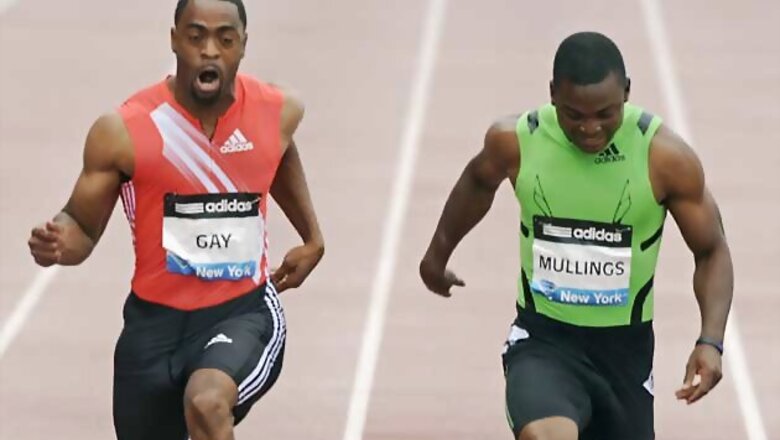
views
London: International officials are looking at the bright side of the latest doping scandals to jolt track and field. The positive tests that nabbed top-name sprinters Tyson Gay, Asafa Powell and Sherone Simpson are disappointing but also proof that global drug-testing efforts are working, the IOC and IAAF said on Monday.
The cases, which were disclosed Sunday, come less than a month before the World Championships in Moscow and cast another drug shadow over what is considered the marquee sport of the Olympics.
"I am naturally disappointed, and I would like to reiterate our zero-tolerance policy against doping," IOC President Jacques Rogge said in a statement to The Associated Press.
"Clearly, the fight against doping can never be totally won, but these cases do once again show the effectiveness of the strong, sophisticated and continually evolving battle against doping in sport being waged by the International Olympic Committee and its partners in the Olympic Movement."
Gay, the American-record holder in the 100 and the fastest man at the distance this year, said he tested positive for a banned substance in an out-of-competition doping control on May 16. He hasn't identified the substance and is awaiting the testing of his backup "B'' sample.
Powell, the former world-record holder in the 100 and second-fastest man this year, tested positive for the stimulant oxilofrine at Jamaica's national championships last month. Jamaican teammate Simpson, a three-time Olympic medalist, tested positive for the same stimulant.
In total, five Jamaican athletes tested positive for a banned substance at the national championships, including Olympic discus thrower Allison Randall. The other two athletes have not been identified by the Jamaica Athletics Administrative Association.
on Monday, Adidas suspended its sponsorship of Gay, who has endorsed the German shoe and sports manufacturer since 2005. The company invoked a clause in Gay's contract relating to doping.
"We are shocked by these recent allegations, and even if we presume his innocence until proven otherwise, our contract with Tyson is currently suspended," Adidas said in a statement.
Also on Tuesday, Italian police confiscated unidentified substances in a raid on the hotel where Powell and Simpson were staying. Rooms of the athletes and physical trainer Christopher Xuereb of Canada were searched and drugs and supplements were seized, Udine police captain Antonio Pisapia told The Associated Press.
Pisapia said it was unclear if the substances were illegal, and that they were being analyzed.
"We are examining the substances now," Pisapia said. "No arrests have been made and nobody has been placed under investigation."
The raid took place at the Fra i Pini hotel in Lignano Sabbiadoro in northeastern Italy.
In recent years, the IOC and International Association of Athletics Federations have focused on increased out-of-competition testing and storage of samples for retesting and retroactive sanctions. The IAAF and some other sports now use the blood passport system, which monitors an athlete's biological profile over time for signs of cheating.
The news about Gay, Powell and Simpson came a month after another top sprinter - Jamaican Olympic gold medalist Veronica Campbell-Brown - tested positive for a banned diuretic.
"While not perfect, the methods are ever improving, with blood passports and the ability to test athletes 24/7 in and out of competition proving to be effective in catching cheats and acting as deterrents," Rogge said. "We also keep samples for eight years now so that improvements in testing can catch cheats long after the games are over."
IOC vice president Thomas Bach, who leads the committee's investigations into Olympic doping cases, said the latest news is "disappointing and encouraging at the same time."
"Should all the information be confirmed at the end of the day it would be a great disappointment that some athletes obviously haven't yet understood that there is zero tolerance in the fight against doping,'" the German said. "Catching the cheats is important but only a means to the end of protecting the clean athletes.
"At the same time yesterday's news is encouraging because it proves that the system of testing is working and no cheat is on the safe side. The fight against doping takes time and will never be ending but we are fighting it with all the necessary consequences."
The IAAF, which carries out more tests than any other international federation, also sought to emphasize the positive from the latest body blow to the sport.
"The IAAF's commitment to anti-doping in athletics is unwavering because we have an ethical obligation to the majority of athletes who believe in clean sport," IAAF spokesman Nick Davies said. "It is for them that we have built a program that is well resourced, far reaching and sophisticated
"The fact that we are able to detect and remove from the sport athletes who have breached our anti-doping rules should be seen in this context. The credibility of our anti-doping program, and the sport of athletics, is enhanced, not diminished, each time we are able to uncover a new case and we have the committed support of every athlete, coach or official who believes in clean sport."
The spate of high-profile drug cases has again focused attention on the issue of doping sanctions.
A two-year ban is the standard penalty for a first serious offense, though the punishment can be lighter for stimulants and in cases where athletes can prove there was no intention to enhance performance.
Under the proposed new World Anti-Doping Code, the standard penalty will be doubled to four years, still short of the automatic lifetime ban espoused by some officials.




















Comments
0 comment